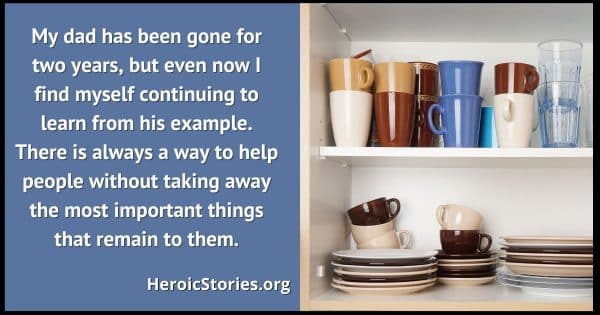Mary Burton, Michigan, USA

My uncle was my father’s older brother. When I was a child, my aunt and uncle lived a few hours away from my parents. They didn’t have children and lived in a small house in a factory town.
My uncle walked with a cane after he was diagnosed with multiple sclerosis. Back in the 1950s, he was considered unable to work, so my aunt worked full-time to support them. She was responsible for her elderly mother, who lived with them too. At 10 years old, I didn’t understand that their financial situation was precarious.
During a family visit to their home, my aunt asked me to get a cup so she could pour me some milk. When I reached into the cupboard for a glass, I saw that one of the drinking glasses on the shelf held a $10 bill. I grabbed it and demanded to know why they kept money in a glass. At the time, $10 was a respectable amount of money.
I don’t remember their answer. Eventually, I learned my father had hidden the money there. He wanted to help his brother but didn’t want to insult him by handing him cash, which his brother surely would have refused. Like many people raised during the Great Depression, they took pride in taking care of themselves and never asking for help. Dad knew the money would be discovered after our visit, thus avoiding any face-to-face discussion and refusal to keep the cash.
Many years later, my aunt told me about going to settle up with the funeral home after my uncle died. She discovered Dad had already paid it in full.
Although my discovery thwarted my dad’s effort that time, I learned a lot about generosity, pride, and how people help one another while leaving their dignity intact. My dad has been gone for two years, but I continue to learn from his example. There is always a way to help people without taking away their pride.
Podcast: Play in new window | Download (Duration: 3:12 — 3.0MB)


The comment this person makes about being a 10 year old in the 1950s and demanding to know why folks kept money in a glass is quite affable ….. 10 year olds in the 50s didn’t DEMAND anything.
In the 1950’s, $10.00 was significant. It would buy a lot of groceries.
A lot of elderly people today are in the same situation as his uncle and aunt, they have little income and barely make it every month. Ten dollars isn’t worth much today but it can make a difference to some people.
When you see people in public you can tell that some have little extra. Figure out how to help even if you don’t know them. If they are in a restaurant, pay for their meal, pay their grocery bill at the store. They may object but they will be thankful.
Upon reading Mary Burton’s “The $10 Bill,” a long forgotten and life
affirming memory came to me. During college three of us chose to
be roommates the entire four years.
There were three times when I was very worried about money. Someone
in that room put $50 in my dresser drawer each time. I know who it was
but words were never spoken.